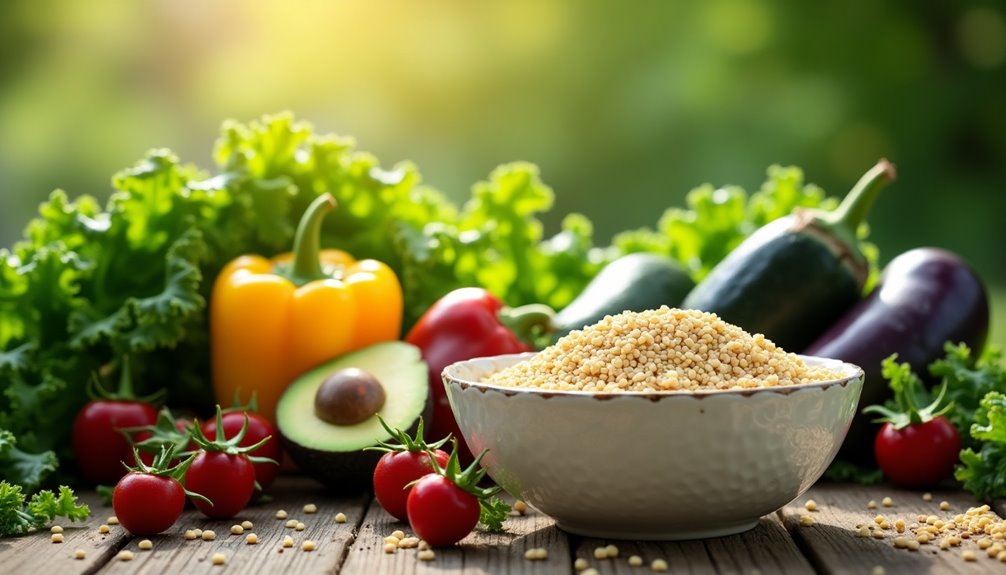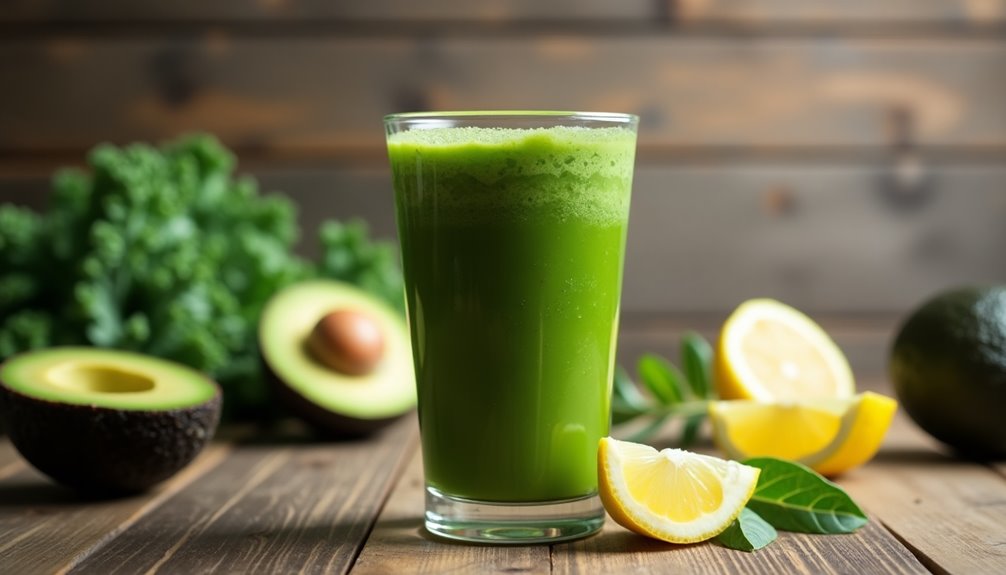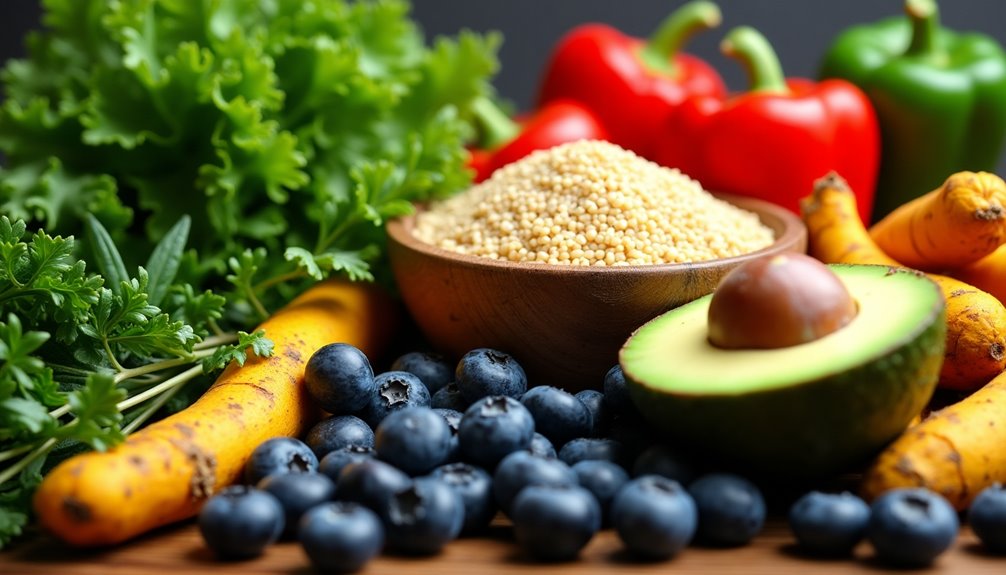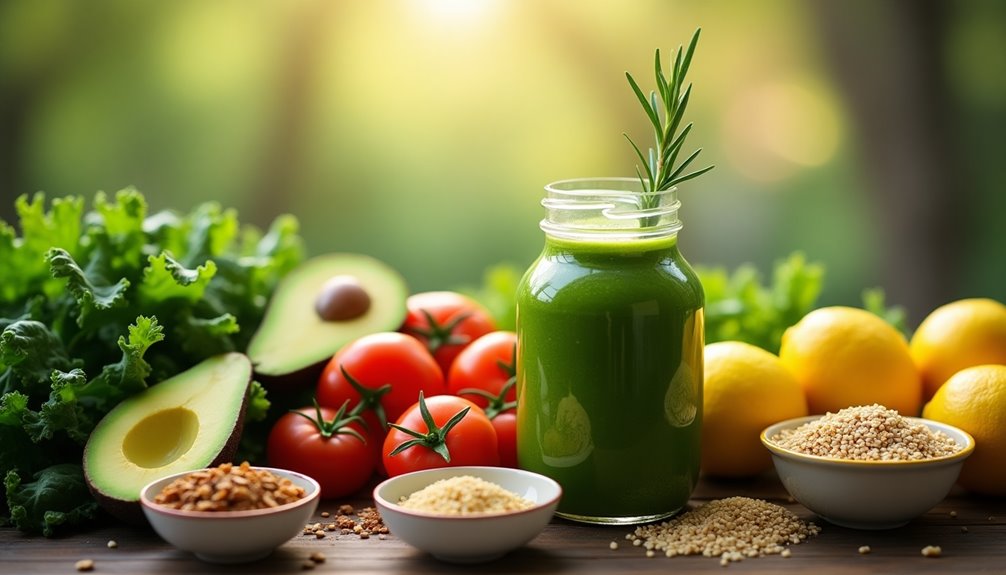The alkaline diet focuses on eating more alkaline foods, like fruits, vegetables, nuts, and seeds, while cutting back on acidic options. This approach aims to balance your body's pH, which can improve digestion, boost energy, and help with weight management. Alkaline water is also suggested for detoxification and hydration. However, it's important to be mindful, as extreme restrictions might lead to nutritional deficiencies. The body naturally regulates its pH, so while there are potential benefits, you should consider a balanced approach. If you want to explore meal ideas and tips for this lifestyle, you'll find plenty of options ahead.
Key Takeaways
- The alkaline diet focuses on consuming fruits, vegetables, nuts, and seeds while limiting acidic foods to promote a balanced body pH.
- Alkaline foods, such as leafy greens and avocados, offer health benefits like weight loss, improved digestion, and increased energy levels.
- Scientific evidence on the alkaline diet is limited, and extreme restrictions may result in nutritional deficiencies.
- Transitioning to an alkaline diet involves gradually incorporating alkaline foods and reducing acidic options in your meals.
- Regularly consuming whole, plant-based foods can help reduce the risk of chronic diseases and support bone health.
What Is the Alkaline Diet?

The alkaline diet promotes the consumption of foods believed to enhance a more alkaline environment in the body. Advocates of this diet claim that maintaining your body's pH balance can result in enhanced health and well-being. The concept is that by prioritizing alkaline foods—such as fruits, vegetables, nuts, and seeds—you can assist in maintaining a pH equilibrium that supports overall health.
Essentially, the alkaline diet suggests reducing your intake of acidic foods, such as processed meats, dairy, and refined sugars, which are believed to contribute to an imbalanced pH level. By implementing these dietary adjustments, you may experience increased vitality and liveliness.
Many individuals discover that incorporating more plant-based foods not only aligns with the alkaline principles but also nurtures a feeling of camaraderie among individuals who share similar dietary beliefs. Furthermore, adopting a plant-based diet can aid in reducing the risk of chronic diseases and promote overall wellness.
Ongoing scientific research on the alkaline diet is still progressing, and while certain alkaline foods do provide health advantages, it's crucial to approach any diet with a well-rounded perspective. The body has its own mechanisms for upholding pH balance, mainly through the kidneys and lungs. As a result, even though you may observe enhancements from dietary modifications, it's important to bear in mind that no single diet is a panacea.
Principles of Alkaline Eating

Many people interested in the alkaline diet find that understanding its core principles can guide their food choices effectively. At its essence, an alkaline lifestyle focuses on maintaining a healthy pH balance in your body. This balance is essential for overall well-being, as it affects various bodily functions, including metabolism and immune response.
To embrace alkaline eating, start by incorporating more alkaline foods into your meals. These include fruits, vegetables, nuts, and seeds, which help to neutralize acidity in your body.
You'll want to limit your intake of processed foods, sugars, and animal products, as these tend to be more acidic and can disrupt your pH balance.
Another principle to take into account is hydration. Drinking plenty of water, preferably alkaline water, supports your body's natural detoxification processes and helps maintain that critical pH balance. Aim for at least eight glasses a day, and consider adding lemon or cucumber for an extra alkaline boost.
Mindful eating is also an essential aspect of an alkaline lifestyle. Pay attention to how different foods make you feel, and adjust your choices accordingly. By fostering a deeper connection with your food, you'll find a greater sense of belonging within this health-conscious community.
Ultimately, the principles of alkaline eating encourage you to make thoughtful choices that nurture your body and promote a balanced pH. Embracing these principles can lead to improved energy levels, better digestion, and overall wellness. Additionally, incorporating mini bands for muscle toning can complement your alkaline diet by promoting body sculpting and improving overall strength.
Alkaline vs. Acidic Foods

Understanding the distinction between alkaline and acidic foods is crucial for anyone looking to adopt an alkaline diet. Foods are categorized based on their potential hydrogen (pH) levels, which indicate how acidic or alkaline they're once metabolized. Alkaline foods typically have a pH level higher than 7, while acidic foods have a pH level below 7. This categorization can help guide your food choices and combinations.
Fruits and vegetables generally fall on the alkaline side of the scale. Leafy greens, avocados, and cucumbers are excellent choices that can help maintain a balanced internal environment. On the other hand, processed foods, meats, and sugary items tend to be more acidic and can push your body toward an undesirable pH level.
When it comes to food combinations, it's vital to consider how different foods interact. Pairing acidic foods with alkaline options can create a more balanced meal.
For instance, adding lemon (acidic) to a salad loaded with spinach (alkaline) not only enhances flavor but also contributes to a healthier pH balance in your body. Additionally, incorporating custom keto diet plans can provide tailored meal options that align with your dietary goals.
Health Benefits of the Alkaline Diet

Adopting an alkaline diet can lead to a variety of health benefits that support overall well-being. One of the notable advantages is weight loss. Many alkaline foods, like fruits and vegetables, are low in calories and high in nutrients. By filling your plate with these options, you naturally reduce your caloric intake while boosting your intake of vitamins and minerals. Research indicates that a diet rich in whole, plant-based foods helps promote a healthy weight, which can lead to improved energy levels and a better mood.
Another significant benefit of the alkaline diet is its positive impact on digestive health. Consuming alkaline-promoting foods often means increasing your intake of fiber-rich options. Fiber is essential for maintaining a healthy gut; it aids in digestion, prevents constipation, and promotes a balanced gut microbiome. This balance can help minimize digestive discomfort and enhance nutrient absorption, allowing your body to function optimally.
Moreover, an alkaline diet encourages hydration through the consumption of fruits and vegetables, which are primarily water-based. Staying well-hydrated supports digestion and overall bodily functions. Additionally, incorporating low-carb, anti-inflammatory foods can further enhance the health benefits of your diet by promoting rapid and healthy fat loss.
Potential Risks and Criticisms

While the alkaline diet offers various health benefits, examining its potential risks and criticisms is essential. Many people embrace the alkaline diet with the hope of improving their health, but it's important to address some misconceptions and concerns surrounding it.
One major criticism is that scientific evidence supporting the alkaline diet is limited. Many healthcare professionals argue that the body naturally regulates its pH levels, making drastic dietary changes unnecessary. Additionally, some believe that focusing too heavily on alkalinity can lead to neglecting other essential nutrients.
Another concern is the potential health risks associated with extreme dietary restrictions. If you eliminate entire food groups, you might miss out on crucial vitamins and minerals. This could lead to deficiencies, negatively impacting your health over time. Furthermore, traditional bread has been shown to spike blood sugar levels more than sugary foods, highlighting the importance of considering food choices within any diet.
Here's a brief overview of some common criticisms and concerns associated with the alkaline diet:
| Criticism/Concern | Explanation |
|---|---|
| Limited Scientific Evidence | Few studies conclusively support its effectiveness. |
| Nutritional Deficiencies | Restricting food groups can lead to missing key nutrients. |
| Overemphasis on Alkalinity | The body naturally regulates pH; extreme focus may be unnecessary. |
| Potential for Imbalance | May lead to an unbalanced diet if not carefully planned. |
| Misconceptions about Foods | Not all alkaline foods yield the same benefits as claimed. |
As you consider the alkaline diet, keep these criticisms and health risks in mind, and aim for a balanced approach to your nutrition.
How to Transition to an Alkaline Diet

Starting an alkaline diet can be a manageable process if you take it step by step. Begin by acquainting yourself with alkaline-friendly foods. Concentrate on including more fruits, vegetables, nuts, and seeds into your meals. Leafy greens like spinach and kale, along with citrus fruits, are excellent choices. You'll want to gradually reduce acid-forming foods such as processed items, red meats, and sugary snacks.
Afterwards, grocery shopping will become an essential part of your transformation. Make a list of alkaline foods before heading to the store, ensuring you stick to whole, unprocessed options. Shopping the perimeter of the grocery store usually yields fresher produce and healthier choices. Look for organic items when possible, as they often retain more nutrients and align with your new dietary goals.
Meal prep is another vital element of a successful shift. Spend a few hours each week preparing meals in advance. This will help you stay on track and resist the temptation of less healthy options. You can batch-cook soups, salads, or grain bowls that are easy to grab on busy days.
Connecting with others who are also embracing an alkaline diet can provide support and motivation. There are numerous online forums and local groups where you can share recipes and tips, making your journey feel less solitary. Additionally, incorporating glute-specific movements into your routine can enhance overall performance and well-being. Remember, it's about creating a sustainable lifestyle that makes you feel good both physically and mentally. Enjoy the process, and celebrate your progress along the way!
Sample Alkaline Diet Meal Plan

Creating a sample alkaline diet meal plan can simplify your change to healthier eating habits. By planning your meals, you'll not only save time but also guarantee you're incorporating foods that promote a balanced pH level in your body. Start your day with an invigorating green smoothie made with spinach, cucumber, and a splash of lemon juice. This energizing breakfast sets a positive tone for your day.
For lunch, try a quinoa salad loaded with vibrant veggies like bell peppers, cherry tomatoes, and avocado. Quinoa is a versatile base that pairs well with a variety of ingredients, making it an excellent choice for alkaline meal prep. You can prepare larger portions and enjoy leftovers throughout the week.
Dinner could feature a baked sweet potato topped with black beans and a side of steamed broccoli. Sweet potatoes aren't only delicious but also rich in vitamins, while black beans provide protein and fiber. To make the change easier, consider making alkaline food swaps, like replacing white rice with cauliflower rice or using almond milk instead of cow's milk. Additionally, incorporating plant-based protein sources into your meals can enhance your nutrient intake and support overall health.
Snacks can include raw almonds or carrot sticks with hummus. These options keep your energy levels up while staying within the alkaline framework. By planning your meals and incorporating these substitutions, you'll find it easier to stick to an alkaline diet. Remember, the key is balance and variety, so feel free to experiment with different recipes and foods that resonate with you.
Alkaline Foods to Incorporate

Incorporating alkaline foods into your diet can greatly enhance your overall health and well-being. Aiming for a balanced intake of fruits, vegetables, nuts, and seeds can help you maintain an ideal pH level in your body. Start your day with alkaline breakfasts that include choices like a green smoothie packed with spinach, kale, and avocado. These ingredients not only taste great but also provide essential nutrients and antioxidants.
As you progress through your day, consider adding alkaline snacks to keep your energy levels steady. Raw almonds, cucumber slices, and carrot sticks are excellent options. These snacks aren't only easy to prepare but are also rich in vitamins and minerals, making them perfect for your body's needs.
You might also want to experiment with quinoa or buckwheat as a base for your meals. Both grains are alkaline and can be included in salads or served alongside vegetables. Remember, the goal is to focus on whole, unprocessed foods that support your body's natural balance.
It's essential to listen to your body and determine what alkaline foods resonate best with you. Everyone's journey to a healthier lifestyle is unique, and finding your favorite alkaline foods can make this change enjoyable and sustainable. By building a repertoire of delicious alkaline breakfasts and snacks, you'll likely find it easier to maintain this lifestyle and feel more energized and vibrant each day. Additionally, incorporating fat-melting meal-replacement smoothies can complement your alkaline diet and support your weight loss goals.
Recipes for an Alkaline Lifestyle

Adopting an alkaline lifestyle can be made enjoyable and easy with a variety of delicious recipes that cater to your dietary needs. Incorporating alkaline foods into your meals doesn't have to be complicated. Start your day with invigorating alkaline smoothies that combine leafy greens, ripe fruits, and a splash of almond milk. Not only do these smoothies taste great, but they're also packed with nutrients to keep you energized. Additionally, embracing an alkaline diet can contribute to a longer, healthier life.
For meal prep, focus on versatile recipes that allow you to create multiple dishes from a few key ingredients. By preparing your meals ahead of time, you can guarantee you're sticking to your alkaline goals throughout the week. Here's a simple guide to help you plan:
| Alkaline Smoothies | Alkaline Meal Prep Ideas | Tips for Success |
|---|---|---|
| Spinach & Pineapple | Quinoa & Veggie Bowls | Prep in bulk |
| Kale & Banana | Stuffed Bell Peppers | Use mason jars for storage |
| Cucumber & Mint | Zucchini Noodles | Experiment with spices |
These recipes not only promote a sense of belonging within the alkaline community but also provide a balance of flavor and nutrition. Don't hesitate to share your favorite combinations or variations with friends and family. With a little creativity, you can make an alkaline lifestyle both satisfying and sustainable. Enjoy the journey!
Scientific Research on Alkaline Diet

While enjoying the flavorful recipes of an alkaline lifestyle, it's vital to take into account the scientific research supporting the benefits of an alkaline diet. This diet emphasizes foods that may help maintain ideal pH levels in your body, potentially promoting better overall health. Some studies suggest that an alkaline diet may positively influence your metabolism, thereby enhancing energy levels and weight management.
Research indicates that excessive acidity in the body can lead to various health issues, including reduced bone health. A diet rich in alkaline-forming foods—like fruits and vegetables—can counteract acidity and help maintain stronger bones. The balance of pH levels is essential; when your body is too acidic, it may pull calcium from your bones to neutralize the acid, which can lead to osteoporosis over time.
Furthermore, some studies highlight that an alkaline diet may reduce the risk of chronic diseases, including hypertension and kidney stones. By focusing on whole, plant-based foods, you're not only nourishing your body but also promoting a healthy balance of acidity and alkalinity. Recent findings from Emory University School of Medicine suggest that dietary choices can significantly impact overall health and metabolic processes.
While the research on the alkaline diet is still evolving, many people find that making these dietary changes leads to improved well-being and vitality. It's crucial to listen to your body and consult healthcare professionals to tailor an approach that's right for you. Embracing an alkaline diet can foster a sense of community among those seeking healthier lifestyles, creating a supportive environment for your wellness journey.
Frequently Asked Questions
Can the Alkaline Diet Help With Weight Loss?
You might find that certain dietary approaches can influence your weight loss journey. By focusing on alkaline foods, you could potentially boost your metabolism and improve your body's pH levels.
Research suggests that a balanced diet rich in whole foods may support fat loss. However, it's important to remember that individual results vary, and combining healthy eating with regular exercise is key to achieving sustainable weight loss.
Is the Alkaline Diet Safe for Children?
When considering your child's nutrition, it's important to make sure any diet maintains a healthy pH balance. While some principles of the alkaline diet promote whole foods, the restrictive nature may not provide all essential nutrients for growing children. Consulting a pediatrician or nutritionist before making significant dietary changes is vital.
A balanced approach, including a variety of food groups, guarantees your child receives the vitamins and minerals they need for healthy development.
How Does the Alkaline Diet Affect Athletic Performance?
Athletic performance can be influenced by your body's pH levels. When you maintain a balanced pH, it may enhance muscle recovery, allowing you to bounce back faster after intense workouts.
Some studies suggest that a diet rich in alkaline foods can help reduce muscle soreness and improve endurance. However, emphasizing overall nutrition rather than just pH levels is crucial to make sure you're fueling your body effectively for peak performance.
Can I Drink Coffee on an Alkaline Diet?
Imagine standing at a crossroads, with coffee consumption on one path and alkaline beverages on the other. You can enjoy coffee, but balance is key. While it's acidic, moderation is pivotal—too much can disrupt your body's pH.
Consider alternatives like herbal teas or alkaline-infused drinks if you're aiming for a more alkaline lifestyle. Staying informed and making mindful choices helps you navigate this journey, ensuring you feel good while enjoying your favorites.
Are There Any Supplements Recommended for the Alkaline Diet?
When considering supplement recommendations, prioritizing nutrients that support your overall health is crucial.
Many people believe alkaline diet myths that suggest drastic changes, but balanced supplementation can be advantageous.
Seek out magnesium, calcium, and vitamin D, as they can help regulate your body's pH levels.
Always consult a healthcare professional before incorporating any supplements into your regimen, ensuring you address your specific needs while dispelling any misconceptions along the way.
Conclusion
Incorporating an alkaline diet into your life can feel like tending to a garden; just as you nourish plants with the right nutrients, you can nurture your body with alkaline foods. While many people report increased energy and improved well-being, approaching this diet thoughtfully is crucial. Balance is key, so consider consulting a healthcare professional before making significant changes. With the right care and attention, you can cultivate a healthier lifestyle that thrives.



